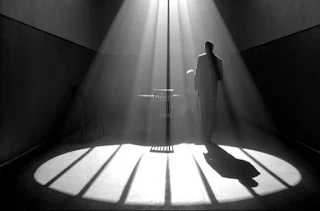Inception was a colossal strain on my attention span , as was director Chris Nolan's previous film The Dark Knight. Both the films were well mounted and the available budgets were well used--as they say, you could "see the money on the screen"--but Nolan mistakes plot confusion and ambiguity for some variant of poetic ellipsis; some issues are unresolved, or forgotten about, it seems, as the crowded confines of I and DK pile on the dialogue, the mid-chase explanations, the chaotic , jagged cuts between parallel scenes. The plot concerns of Inception are the stuff that made Phillip K.Dick such a brilliant, if harried science fiction writer; Leonardo DiCaprio as a high tech industrial spy who has the skill and technology to enter a subject's mind during sleep and extract professional secrets for business rivals. The problematic point , though, is that he's haunted by the death of his wife, who's image keeps appearing in the dreamscape he and his team construct to fool the sleeping subject. She is the ghost that follows the team leader in whatever scenario he concocts-- her appearences no good.
Nor do they bode well for cohesive story telling; after a splendid first thirty minutes in which the viewer is landed in the middle of the action--a tasty variation of the James Bond tuxedo-ed assassin ploy--the film chokes on back stories, flashbacks, and stretches of dialogue that seek to contextualize the hurried scenes.
Had the film been a leaner, less cluttered tale, attempting, as it does, the sort of convoluted layering a competent commercial novel might have, Inception might have been an intelligent adventure film: issues of love, morality, political economy, redemption could have been discussed in conjunction with concurrent action. The abstract (a conventional set of ethical challenges , really) would have been realized cogently in the narrative flow. The movie, though, stops again and again and yet again with a flashback, an extended pause in the momentum, so DiCaprio can discuss his feelings, make a another emotional breakthrough.
Confusion and ambiguity were the working idea behind Momento, and to the degree that Nolan conceived his idea and worked through the variations of a memory-impaired man attempting to advance a plan of vengence in a present he couldn't keep in mind, it worked splendidly, wonderfully. The film had an ironic twist--a real one, not one of those cookie cutter conclusions that wallow in the irresolution of a conflict--which made the fractured plot coherent, finally,and illustrated consequences beyond what the hero or the villians could imagine.The various scenarios at play in Inception, though were, of themselves , simple enough, but Nolan's problem was pacing and, sorry to say, the inability to make the characters connect with a believable emotion. The film was rather frantically edited , and the cutting between the three dreamscapes in the last third of the film were long in duration. The effect on this viewer was a loss of interest in a mission who's impetus was more hysterical than urgent.
All this makes Christopher Nolan a lead-footed action director who is intent on turning the pleasures of pulp genres into think pieces and talky existential dioramas. Economy is the key, of course, and decisiveness is the quality needed the most; conviction about the genre your using to get your narrative ideas across. A fresh idea would have helped , though, or at least a fresh approach on using old ones; Inception has deep echos of The Matrix, Heat and Solaris during it's length, the result being an interesting, if tedious distortion of what seems to have started out as an interesting idea.






